T-Mobile takes its unrivaled 5G network to the next level with latest tech breakthrough

For a while there back in late 2019 and essentially all through 2020, practically everything that T-Mobile announced in relation to its 5G network was a pioneering or forward-thinking move. The "Un-carrier" was the first in the US (or even the world) to adopt multiple cutting-edge and trend-setting technologies, which were then slowly expanded across the nation, improved, and refined to leave Verizon and AT&T in the dust... for the time being.
More mature and reliable than ever before, America's largest and fastest 5G network continues to gain killer new capabilities, like Voice Over 5G, aka VoNR, aka Voice Over New Radio.
This particular breakthrough has been a long time coming, and according to CNET, it has undergone exhaustive testing "for months" in Portland, Oregon, and Salt Lake City, Utah, where it's now finally available to the (Galaxy S21 5G-using) masses in "select areas."
We're obviously talking about Samsung's entire early 2021-released high-end handset family, with the newer and naturally faster Galaxy S22 lineup due to join the Voice Over 5G party at some point soon, alongside other unnamed 5G-enabled devices on T-Mobile from presumably more than one brand.
If you own an S21, S21+, or S21 Ultra in one of the two aforementioned cities, you might soon notice a shorter delay than usual between dialing a number and hearing your phone start ringing. That doesn't sound like a very big deal (because it's not), but as always, T-Mo is thinking more of the future when hailing this as another key technology milestone on the road to ubiquitous (standalone) 5G service.
In a nutshell, voice traffic can now begin to be carried through the first (and still only) nationwide standalone 5G network in the US, freeing up precious resources to (eventually) enable super-advanced capabilities like network slicing requiring a "continuous connection to a 5G core."
No, we don't really understand all of that either, but we do know 5G is the future, and making it possible for all services to rely on 5G rather than maintaining an underlying 4G LTE network and 4G core for things like voice calls is clearly another important step in the right direction for T-Mobile.
It's perhaps needless to highlight that Verizon and AT&T are both several steps behind their arch-rival on Voice Over 5G, having no clear goal to embrace the technology anytime soon after getting to a late start in the low and mid-band 5G network deployment fields as well. Oh, and their standalone 5G rollouts are not exactly close on the horizon either.

















Things that are NOT allowed: